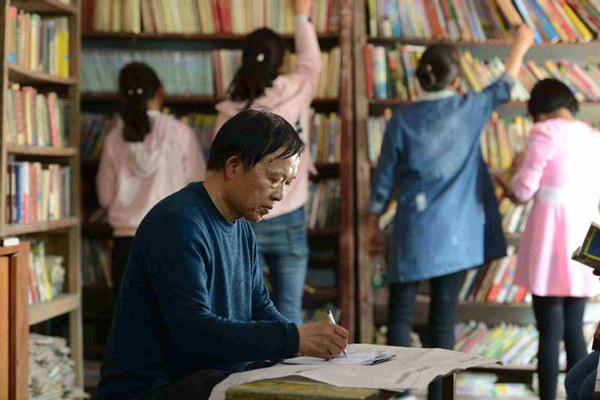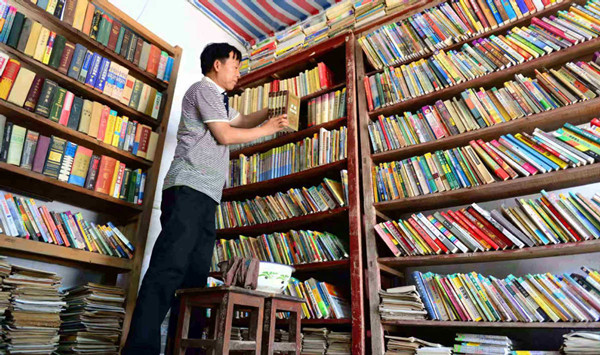Villager's library closes the book on poverty
Updated: 2021-04-29

Du Dejian reads at the library in a room of his adobe dwelling. [Photo provided to China Daily]
Forty years ago, Du Dejian established a "library" for farmers in a shabby room of his adobe dwelling in Zhangfang village, Shanxi province. Since then, the library has been developed into a two-story building that houses 40,000 books and hundreds of newspapers and magazines.
Du said over the decades more than 15,000 villagers have used the library's resources to improve their knowledge and learn agricultural techniques that have helped them beat poverty. About 80 families acquired legal knowledge to defend their rights, while thousands of farmers have benefited from training sessions on agricultural production organized by the library.
Du said the interior of the library is much better equipped than when it started and boasts two new computers, an electric heater, two air conditioners and a 165-cm TV.
A difficult start
In the late 1970s, when China's reform and opening-up had just begun, villagers in Zhangfang were excited about the prospects for agricultural production. "However, because of a lack of knowledge and techniques, people often used pesticides and chemical fertilizers in the wrong way, resulting in great economic losses," he said.
Du, who was 18 at the time, was determined to help his fellow villagers by building "a hall of knowledge for farmers".
However, like most other villagers in Zhangfang his family was poor. In order to buy the books and pay for the newspaper and magazine subscriptions, Du saved every spare penny and raised funds by selling ice creams in summer and firecrackers in winter.
His persistence paid off, and on Jan 1, 1981, Du opened the library in a room at his home.
Despite a small income, Du managed to pay the yearly subscriptions on hundreds of newspapers and magazines totaling 2,000 to 3,000 yuan ($308-$462), which has been a heavy financial burden on his family.
Fortunately, Du would not be alone for long in his endeavors. Hearing his story, local government departments and nongovernmental organizations lent a hand.
The education bureau of Yuncheng city in Shanxi gave him some bookshelves, two factories helped Du raise money for the library and the province's culture department and a bookstore donated books. Taiyuan University of Technology bought the library a computer.

Du Dejian tidies books at his library in Zhangfang village, Shanxi province. [Photo provided to China Daily]
Attracting visitors
An unexpected problem was attracting visitors.
Du said after the library opened, some villagers came to have a look out of curiosity and then never showed up again as less-educated farmers had no interest in reading books.
To attract villagers to the library, Du tried many approaches. He put a pool table and TV inside in the hope that they would draw people in.
He also encouraged library members to sign their friends up and explain that they can borrow the books for free.
In addition, he organized night classes and published a newspaper to spread information to villagers on advances in agricultural production. Villagers started using the library in greater numbers and many of them began to benefit from reading and studying there, Du said. "Villager Shang Yunshe is a frequent library visitor. By reading books, he gained inspiration and made a fortune by investing in businesses such as tofu making, fungi growing and the animal breeding industry," Du said.
Villager Du Lijian was also a regular reader at the library. He has excelled in electrical engineering and now leads a good life in Yuncheng. Another villager, Fan Qiaoling, learned grape-planting techniques from books in the library and has now become a successful grape grower, Du Dejian said. "Her grapes are big and sweet and she has a good harvest each year," he said.
Having benefited from Du Dejian's library, the villagers show their appreciation when they can.
"In the harvest season, when I am busy with matters at the library, my fellow villagers harvested my crop for me, and some like Fan Qiaoling send grapes she has grown as a gift," Du Dejian said, adding he is grateful for their kindness.
A new challenge
The growth of the internet has thrown up another challenge. Library attendance has dwindled as people pay more attention to short videos and only read fragments of information.
Du Dejian is worried the library might shut down one day due to a lack of visitors. "If that really happens, all the books, newspapers and magazines here would be left unread and couldn't play a role in changing people's minds or helping them," he said.
Du Dejian's solution is to adapt reading to a society focused on digital information. He has initiated "book crossing", which originated in Europe half a century ago and involves leaving a book in a public place to be picked up and read by a multitude of people.
He has also set up WeChat groups and put his informal newspaper online to ensure that the latest agricultural production technologies are shared with people who need them. His efforts are paying off, and Du Dejian said library visits are on the rise again.



